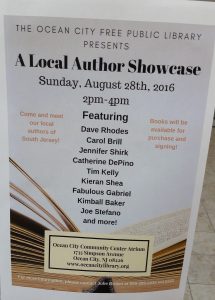Many authors find marketing difficult. It’s awkward, embarrassing, and confusing. Even writing marketing copy can be a struggle.
Why is it so hard?
I think it’s because we are told over and over that WE are the brand, not our books. And many authors are introverts, so putting ourselves out there as a brand is tough.
Also, it is common to believe that you are nothing special. Many people suffer from Imposter Syndrome, writers perhaps more than the general population. That feeling that you are a fraud and everyone will find out is quite a deterrent to opening ourselves up to the public.
Another prevalent human condition is to assume that what you know, everyone knows. We literally cannot see how knowledge and skills that we use every day can be of interest to anyone else. To us they are ho-hum, and we fail to see the value.
I am currently writing campaign materials, so I am thinking a lot about marketing myself. And I am finding that this is easier than author marketing–perhaps because I am able to focus on the benefits I can bring to the position. Writing the campaign pieces is much like writing a resume–take your know skills and show how they apply to the potential job.
Many marketing gurus will say to sell the benefits of your books or the problem your book will solve for the reader rather than the book itself. I find it much easier to tout the benefits of a non-fiction book. Such a book usually has a clear purpose, a defined audience. I find this hard to do for fiction. My book is a middle grade fantasy. Hopefully one of the benefits is that the readers enjoy it. If they also pick up on and resonate with the themes of being true to yourself, protecting the environment, friendship, and not becoming an oppressive dictator, that’s a bonus.
How about you? How do you sell the benefits of your books, especially if it is fiction?



Back to School, Back to Work
Today is my daughter’s first day back to school–which means it is also my first day back to work. Now I will have about 6 hours a day to accomplish things before she comes home. I like this schedule because it gives me quiet, concentrated time to work. Also, because I do it while she’s not home, I can be more present for her once she comes home. Over the summer it feels like a constant push-pull, wanting to spend the time with her but needing to get certain things done.
I have my plans in place (and we’ll see how those plans work out, LOL). Today I plan to catch up on PTA Treasurer stuff, and maybe squeeze in one or two other household things I’ve been putting off. Tomorrow I have to finish and send to the printer my brochure for my campaign for the local school board. I need them by Sept 22nd, and I have suddenly realized that is not all that far off!
Next week, with those large projects out of the way, I hope to settle into a school-year work routine. A couple of years ago I had one that worked well, but for reasons I still can’t pinpoint, it rather fell apart over the last year. As a result, my productivity slipped and my self-esteem as a writer with it.
I want to get back to writing every day. Doesn’t have to be much every day, but I would like to work on my fiction a little every day. Make it a priority again. Like many of us, I fall into the trap of putting everyone else first. Next thing I know, the day is gone and I’ve done nothing for me or my own work. I want to try to balance that a bit more. I know I’ll feel better about myself if I do, even though it’s hard.
So for me, back to school means back to work. Does back to school change things in your routine?